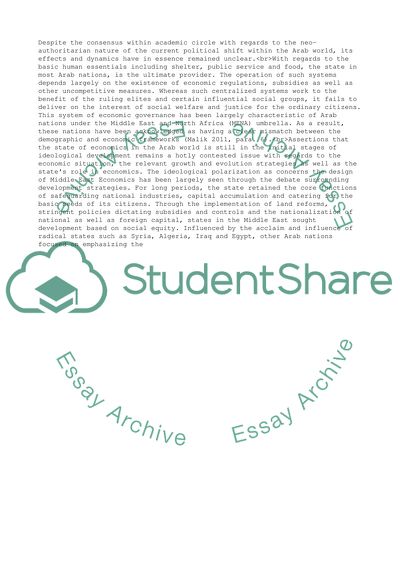Cite this document
(The state in Arab economies is the most important economic actor, Essay, n.d.)
The state in Arab economies is the most important economic actor, Essay. https://studentshare.org/macro-microeconomics/1855189-the-state-in-arab-economies-is-the-most-important-economic-actor-eclipsing-all-independent-productive-sectors-critically-discuss-this-statement-assessing-to-what-extent-privatization-has-resulted-in-the-retreat-of-the-state-from-the-economic-spher
The state in Arab economies is the most important economic actor, Essay. https://studentshare.org/macro-microeconomics/1855189-the-state-in-arab-economies-is-the-most-important-economic-actor-eclipsing-all-independent-productive-sectors-critically-discuss-this-statement-assessing-to-what-extent-privatization-has-resulted-in-the-retreat-of-the-state-from-the-economic-spher
(The State in Arab Economies Is the Most Important Economic Actor, Essay)
The State in Arab Economies Is the Most Important Economic Actor, Essay. https://studentshare.org/macro-microeconomics/1855189-the-state-in-arab-economies-is-the-most-important-economic-actor-eclipsing-all-independent-productive-sectors-critically-discuss-this-statement-assessing-to-what-extent-privatization-has-resulted-in-the-retreat-of-the-state-from-the-economic-spher.
The State in Arab Economies Is the Most Important Economic Actor, Essay. https://studentshare.org/macro-microeconomics/1855189-the-state-in-arab-economies-is-the-most-important-economic-actor-eclipsing-all-independent-productive-sectors-critically-discuss-this-statement-assessing-to-what-extent-privatization-has-resulted-in-the-retreat-of-the-state-from-the-economic-spher.
“The State in Arab Economies Is the Most Important Economic Actor, Essay”. https://studentshare.org/macro-microeconomics/1855189-the-state-in-arab-economies-is-the-most-important-economic-actor-eclipsing-all-independent-productive-sectors-critically-discuss-this-statement-assessing-to-what-extent-privatization-has-resulted-in-the-retreat-of-the-state-from-the-economic-spher.


